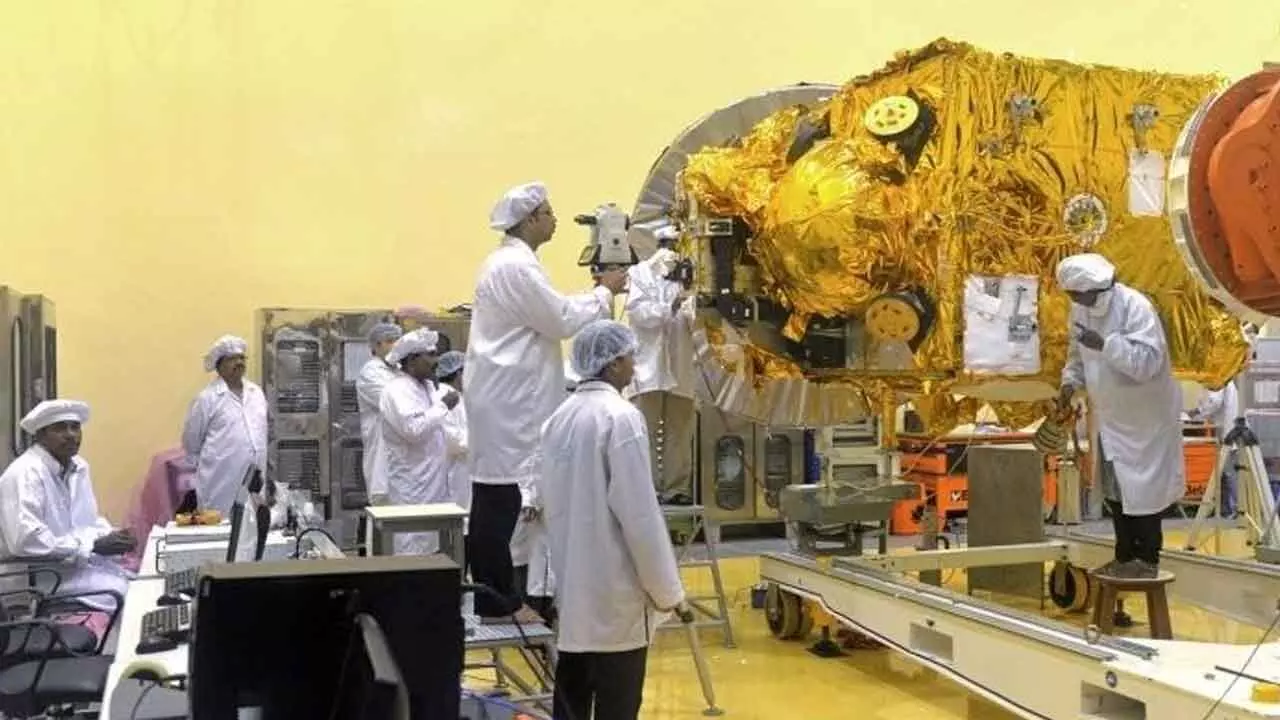Space Technologies Have Great Potential To Help Achieve Viksit Bharat
India’s space economy is currently valued at $8 billion and projected to touch $44 billion by 2033
Space Technologies Have Great Potential To Help Achieve Viksit Bharat

Dr. Goenka emphasized that while space technology has made significant strides, its true commercial value will come from its integration into various industries, encouraging businesses to explore how space data can be used to solve real-world problems, optimize operations, and create new business models
In today's tech-driven world, space technologies have the potential to transform indus-tries and contribute to realising Viksit Bharat.
The Indian National Space Promotion and Authorisation Center (IN-SPACe), an autono-mous body under the Department of Space, is driving private sector participation in space activities. As part of its ‘Decadal Vision’ for the space economy, IN-SPACe has launched a campaign to promote the benefits of space technologies across government and industry. The Confederation of Indian Industry (CII), through its National Committee on Space, has been actively fostering the adoption of space technologies in Indian in-dustries.
To advance this effort, CII and IN-SPACe organised the Conclave on Adoption of Space Applications across Businesses in New Delhi. Themed "Leveraging Space Applications for a Prosperous and Viksit Bharat," the conclave highlighted opportunities in agricul-ture, food processing, logistics, banking, insurance, urban planning, infrastructure, en-ergy, and more.
Dr Pawan Goenka, Chairman, IN-SPACe, Department of Space, spoke of the immense potential of space applications in driving business growth, especially for industries out-side the space sector. He highlighted that the space economy is poised to become a tril-lion-dollar industry, with India’s space economy currently valued at $8 billion and a tar-get of $44 billion by 2033. However, he stressed that the key to unlocking this growth lies in scaling up demand for space applications, particularly in downstream sectors like agriculture, logistics, energy, and manufacturing.
Dr. Goenka emphasized that while space technology has made significant strides, its true commercial value will come from its integration into various industries, encourag-ing businesses to explore how space data can be used to solve real-world problems, op-timize operations, and create new business models.
Dr. Goenka also outlined opportunities for non-space industries to contribute to the space sector, whether through satellite component manufacturing or adopting space technology in their operations. He encouraged private companies to leverage space data for applications like optimizing the location of solar and wind farms, improving logis-tics, and preventing fraud in insurance claims.
Dr S. Somanath, former Chairman of ISRO, spoke of the untapped potential of space applications in India’s business growth. While the global space economy is valued at around $600 billion, India has yet to fully capitalize on space technology, with most efforts focused on demonstrating these technologies to the government rather than translating them into business opportunities. He highlighted sectors like fisheries, logis-tics, traffic management, and agriculture, where space data could drive significant eco-nomic impact.
He emphasized the need for government support in providing continuous space data and fostering innovation in data processing technologies, such as AI and edge compu-ting. He stressed that scaling up space applications in India is critical for growing the country’s space economy. He proposed creating business cases and case studies to showcase the potential of these applications and suggested supporting entrepreneurs to develop solutions that convert satellite data into usable business insights. This would not only drive the growth of the downstream sector but also provide the necessary mo-mentum for expanding the upstream space industry, including satellite manufacturing and launches.
Dr Prakash Chauhan, Director, NRSC, emphasized the transformative potential of space applications in driving economic growth and innovation. He highlighted India's unique approach to space technology, focusing on societal benefits rather than military applications. He also underlined the need for advanced analytics using AI and machine learning to convert raw satellite data into actionable insights. Furthermore, he pointed out emerging areas like blue economy development, critical mineral mapping, and sus-tainability certifications for global trade.
Jayant Patil, Advisor to CMD - L&T Larsen and Toubro Limited, highlighted the transform-ative impact of space applications on innovation, economic growth, and everyday life. He reflected on India’s journey from early satellite-based communication to the current era of unprecedented reforms in the space sector. With initiatives like IN-SPACe, the gov-ernment has created a unique framework that promotes and regulates space activities, enabling private sector participation. He stressed the importance of leveraging space data for precise decision-making, reducing costs in infrastructure projects, and ad-dressing real-world challenges like crop damage and natural disasters. He called for harnessing space applications for broader socio-economic benefits and innovation.

